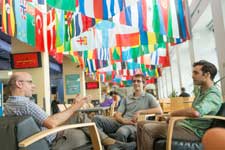Seeking Out the Unexpected
UMBC’s newest prestigious scholarship recipients reflect on the “remarkable gift” of an international experience.
In 2012, Kate Witt ’13, M.A., intercultural communication, became UMBC’s first master’s student to receive a Boren Fellowship. She travelled Brazil to study how non-governmental organizations work with Bolivian immigrants using the Portunhol language, a hybrid of Spanish and Brazilian Portuguese. This year, Witt has received a prestigious Fulbright research award to explore the use of Portunhol in Paraguay as the language evolves through social media. She shares, “I want to be there creating user-friendly systems while simultaneously aiding in preservation of local language through technology. Fulbright offers that opportunity and more.”
Witt is one of seven UMBC students and recent alumni awarded Fulbright grants this year, setting a new record for the university. Three students received English teaching assistantships: Tyler McCafferty ’15, cultural anthropology and environmental studies (Malaysia); Stevenson Ramsey ’14, political science (Indonesia); and Stephen Moore ’15, computer engineering and mathematics (Poland). Four students were awarded research grants: Patrice Matthews ’15, environmental studies (Ecuador); Witt (Paraguay); Cheryl Camillo, Ph.D. student in public policy (Canada); and Jared Margulies, Ph.D. student in geography (India). This year marks the first year that UMBC Ph.D. students have won Fulbright awards to conduct research abroad.
The Fulbright program recognized an additional eight UMBC students as finalists. They include Kelsey Krach ’14, anthropology (Spain); Martha Robichaud ’15, theatre (United Kingdom); Sarah Koolbeck ’15, Asian studies (South Korea); Charlotte Keniston ’14, M.F.A. (Mexico); Rachel Rettaliata ’14, history (Moldova); Ruth Blusiewicz ’15, English and political science (Slovakia); Kymberly Peters ’15, visual arts (Czech Republic); and Molly Bradtke ’14, English, history, and Asian studies (Taiwan).
The Fulbright program is sponsored by the U.S. government to increase mutual understanding between Americans and citizens of other countries. As the government’s flagship international educational exchange program operating in over 160 countries, Fulbright awards English teaching assistantships and research grants to graduating college seniors, graduate students, and young professionals.
Fulbright award recipients are selected for their academic or professional achievement, as well as demonstrated leadership potential in their fields. The experience is also incredibly beneficial for recipients’ future career advancement. Brian Souders, associate director of International Education Services and UMBC’s Fulbright program advisor, reflects, “It gives students that leg up, knowing they’ll be always recognized as a Fulbright scholar.”
UMBC President Freeman Hrabowski recently spoke to International Educator magazine about how study abroad experiences can lead to successful and meaningful careers. Recalling his semester at the American University in Cairo, he discussed how his time in Egypt shaped his perspective as an educator. “I’m always working with colleagues to create a culture that’s welcoming,” he says, “and we’re always encouraging both our American students and our students from other countries go beyond their comfort zones.”
Bambi Chapin, associate professor of sociology and anthropology, received a Fulbright research award to Sri Lanka as a Ph.D. candidate in 1999. She spent nine months studying parenting, political violence, and religious beliefs in the country and eventually wrote Childhood in a Sri Lankan Village (2014) based on that and subsequent research experiences. “Without that initial Fulbright fellowship and the opportunity to immerse myself in everyday life in Sri Lanka, I would not have had the career or the perspective or the family that I have now,” Chapin shares.
Camillo, one of UMBC’s first Ph.D. students to receive a Fulbright award, plans to follow in Chapin’s footsteps, using the next year to pursue a promising line of research into health policy reform in Canada. “During my fellowship, I hope to develop a very strong working knowledge of how provincial health insurance programs operate, as well as how they interact with national and local levels of government,” she says. “I am determined to experience and absorb as much as I can, professionally and personally.”
As an English teaching assistant in Poland, Moore is also excited to jump right into the Fulbright experience. “I love…seeing new places and sharing my knowledge with others, but nothing compares to the conversations you have with locals while living abroad,” he says.
UMBC students will also be traveling the world this year as participants in the Lindau Nobel Laureate Meeting and recipients of Gilman International Scholarships.
Akua Nimarko ’15, biological science and psychology, and Subramani Swaminathan, a post-doctoral researcher in chemistry and biochemistry, were invited to attend the distinguished Lindau Nobel Laureate Meeting in Germany, which brings together Nobel Prize winners and promising young researchers from all over the world.
The competitive Gilman International Scholarship Program offers traditionally underrepresented students grants to study and complete internships abroad. This year’s recipients include Lia Adams ’17, sociology and psychology; Lisa March ’17, Asian studies; Alicyn Curtis ’16, Asian studies and modern languages, linguistics, and intercultural communication; Benjamin Fosbaugh ’17, global studies, economics, and political science; and Megan Derosa ’16, psychology.
For all UMBC students who are traveling the globe through prestigious awards and other study abroad opportunities, President Hrabowski’s words ring true: “It’s so important to understand what it means to immerse yourself in another culture. […] Students who do that are never quite the same.”
As a thankful Fulbright recipient, Moore agrees: “Broadening your view of the world is the most remarkable gift that you can receive from international experiences.”
(7/2/2015)
© University of Maryland, Baltimore County 1000 Hilltop Circle, Baltimore, MD 21250 410-455-1000

